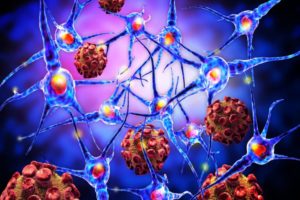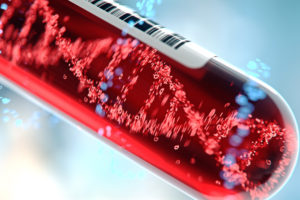Multiple Sclerosis (MS) Biospecimens
Bay Biosciences provides high-quality, frozen sera (serum), K2-EDTA plasma and matched peripheral blood mononuclear cells (PBMC’s), bio-fluids from multiple sclerosis (MS) patients for research.
The PBMCs, sera (serum) and plasma bio-fluid specimens are processed from multiple sclerosis (MS patients peripheral whole-blood using customized collection and processing protocols.

Multiple Sclerosis (MS)
Multiple sclerosis affects the brain and spinal cord and causes symptoms such as fatigue, difficulty walking, and speech issues. There’s no cure yet, but various treatments can help manage the symptoms.
Multiple sclerosis (MS) is a chronic condition involving your central nervous system (CNS). With MS, your immune system attacks myelin, which is the protective layer around nerve fibers.
MS causes inflammation and temporary lesions. It can also lead to lasting lesions caused by scar tissue, which interferes with messages in the affected areas of the brain and spinal cord.
There’s no cure for MS, but it’s possible to manage symptoms. Learn more about the causes of MS, how it’s treated, and more.
Signs of Multiple Sclerosis (MS)
MS can begin with mild to severe symptoms, and it can progress slowly or rapidly. Three of the most common early symptoms of MS are:
- Numbness and tingling that affects the arms, legs, or one side of your face: These sensations are similar to the pins-and-needles feeling you get when your foot falls asleep. However, they occur without a trigger.
- Uneven balance and weak legs: You may find yourself tripping easily while walking or doing some other type of physical activity.
- Double vision, blurry vision in one eye, or partial vision loss: These symptoms can be early indicators of MS. You may also have eye pain.
These early symptoms may go away only to return later. You may go weeks, months, or even years between flare-ups.
These symptoms can have many different causes. Even if you have these symptoms, it doesn’t necessarily mean that you have MS.
Symptoms of Multiple Sclerosis (MS)
Patients with MS experience a wide range of symptoms. Due to the nature of the disease, symptoms can vary widely from person to person.
They can also change in severity over time and even from day to day.
Some of the most common symptoms associated with MS include the following:
Fatigue
Around 80% of people with MS report having fatigue, according to the National Multiple Sclerosis Society (NMSS). Fatigue due to MS can make it harder to do everyday tasks.
Difficulty Walking
Difficulty walking can occur with MS due to:
- Muscle weakness
- Difficulty with vision
- Difficulty balancing
- Numbness in the legs or feet
- Muscle spasticity
Difficulty walking can also lead to injuries if you fall.
Vision Problems
Vision problems are often some of the first symptoms for many people with MS. They may affect one or both eyes. These issues may come and go, get worse over time, or resolve entirely.
Common vision problems associated with MS include:
- Blindness
- Diplopia, or double vision
- Loss of vision in one visual field or both eyes
- Nystagmus, or involuntary movement of the eyes
- Optic neuritis, which can cause pain or blurry vision in one eye
Speech Issues
MS lesions in the brain can affect speech. These speech issues, also known as dysarthria, can range from mild to severe.
Symptoms of dysarthria can include:
- Slurred speech
- “Scanning” speech, where there are long pauses between words or syllables
- Changes in the volume of speech
Other Symptoms
Other common symptoms of MS can include:
- Acute or chronic pain
- Cognitive issues involving concentration, memory, and word-finding
- difficulty chewing and swallowing (Dysphagia)
- Problems with bladder control
- Sleep issues
- Tremors
Diagnosis of Multiple Sclerosis (MS)
A healthcare professional, often a neurologist, performs a neurological exam to diagnose MS. They typically also talk with you about your clinical history and order tests to confirm the diagnosis.
Diagnostic testing may include:
- MRI scan: Using a contrast dye with the MRI allows your doctor to detect active and inactive lesions throughout your brain and spinal cord.
- Optical coherence tomography (OCT): In this test, a picture of the nerve layers in the back of your eye is taken to check for thinning around the optic nerve.
- Spinal tap (lumbar puncture): Your doctor may order a spinal tap to find abnormalities in your spinal fluid. This test can help rule out infectious diseases. It can also be used to look for oligoclonal bands (OCBs), which can be used to diagnose MS.
- Blood tests: Doctors order blood tests to help eliminate the possibility of other conditions that have similar symptoms.
- Visual evoked potentials (VEP) test: This test stimulates the nerve pathways to analyze electrical activity in the brain.
- Brain stem auditory-evoked and sensory-evoked potential tests may also be used to diagnose MS.
An MS diagnosis requires evidence of demyelination occurring at different times in more than one area of your brain, spinal cord, or optic nerves.
Ruling Out Other Conditions
A diagnosis also requires ruling out other conditions that have similar symptoms, such as:
- Lyme disease
- Lupus
- Sjögren’s Syndrome
Types of Multiple Sclerosis (MS)
Multiple sclerosis disease may change and evolve. You can only have one type of MS at a time, but knowing when you transition to a progressive form of MS may be difficult to pinpoint.
Types of MS include the following:
Clinically isolated syndrome (CIS)
CIS is a pre-MS condition involving one episode of symptoms lasting at least 24 hours. These symptoms are due to demyelination in your CNS.
Although this episode is characteristic of MS, it’s not enough to prompt a diagnosis. CIS can fully resolve, and a person can have a single episode without any future episodes.
Having more than one lesion or positive oligoclonal bands (OCBs) in your spinal fluid at the time of a spinal tap, then you might be more likely to eventually be diagnosed with RRMS. If you have evidence of a previous lesion, you might be diagnosed with RRMS during the evaluation for CIS.
If these lesions are absent or your spinal fluid does not show OCBs, you are less likely to receive an MS diagnosis.
Relapsing-remitting MS (RRMS)
Relapsing-remitting MS (RRMS) involves clear relapses of disease activity followed by remissions. During remission periods, symptoms are mild or absent, and there’s mild to moderate disease progression.
RRMS is the most common form of MS at diagnosis and accounts for about 85% of all initial MS diagnoses, according to the NMSS.
Primary progressive MS (PPMS)
In primary progressive MS (PPMS), neurological function becomes progressively worse from the onset of your symptoms.
However, short periods of stability can occur. The terms “active” and “not active” are sometimes used to describe disease activity with new or enhancing brain lesions.
Secondary progressive MS (SPMS)
Secondary progressive MS (SPMS) occurs when RRMS transitions into the progressive form. In addition to disability or gradual worsening of function, you may still have noticeable relapses.

Bay Biosciences is a global leader in providing researchers with high quality, clinical grade, fully characterized human tissue samples, bio-specimens, and human bio-fluid collections.
Samples available include cancer (tumor) tissue, cancer serum, cancer plasma, cancer, peripheral blood mononuclear cells (PBMC). and human tissue samples from most other therapeutic areas and diseases.
Bay Biosciences maintains and manages its own biorepository, the human tissue bank (biobank) consisting of thousands of diseased samples (specimens) and from normal healthy donors available in all formats and types.
Our biobank procures and stores fully consented, deidentified and institutional review boards (IRB) approved human tissue samples and matched controls.
All our human tissue collections, human specimens and human bio-fluids are provided with detailed, samples associated patient’s clinical data.
This critical patient’s clinical data includes information relating to their past and current disease, treatment history, lifestyle choices, biomarkers, and genetic information.
Patient’s data is extremely valuable for researchers and is used to help identify new effective treatments (drug discovery & development) in oncology, and other therapeutic areas and diseases.
Bay Biosciences banks wide variety of human tissue samples and biological samples, including cryogenically preserved at – 80°C.
Including fresh frozen tissue samples, tumor tissue samples, formalin-fixed paraffin-embedded (FFPE), tissue slides, with matching human bio-fluids, whole blood and blood-derived products such as serum, plasma and PBMC.
Bay Biosciences is a global leader in collecting and providing human tissue samples according to the specified requirements and customized, tailor-made collection protocols.
Please contact us anytime to discuss your special research projects and customized human tissue sample requirements.
Types of Biospecimens
Bay Biosciences provides human tissue samples (human specimens) from diseased and normal healthy donors which includes:
- Peripheral whole-blood
- Amniotic fluid
- Bronchoalveolar lavage fluid (BAL)
- Sputum
- Pleural effusion
- Cerebrospinal fluid (CSF)
- Serum (sera)
- Plasma
- Peripheral blood mononuclear cells (PBMC)
- Saliva
- Buffy coat
- Urine
- Stool samples
- Aqueous humor
- Vitreous humor
- Kidney stones (renal calculi)
- Other bodily fluids from most diseases including cancer.
We can also procure most human bio-specimens, special collections and requests for human samples that are difficult to find. All our human tissue samples are procured through IRB-approved clinical protocols and procedures.
In addition to the standard processing protocols, Bay Biosciences can also provide human plasma, serum, and PBMC bio-fluid samples using custom processing protocols; you buy donor-specific collections in higher volumes and specified sample aliquots from us.
Bay Biosciences also provides human samples from normal healthy donors; volunteers, for controls and clinical research, contact us Now.
- 日本のお客様は、ベイバイオサイエンスジャパンBay Biosciences Japanまたはhttp://baybiosciences-jp.com/contact/までご連絡ください。


